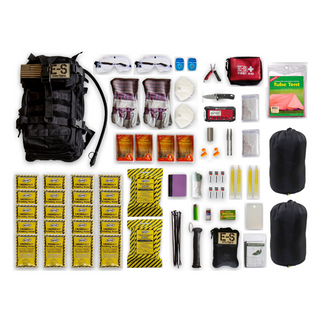Why You Need Echo-Sigma’s Survival Kit: Essential Items for Safety and Preparedness
In today’s unpredictable world, being prepared is essential. From natural disasters to unexpected power outages or an unplanned detour on a camping trip, a well-stocked survival kit can make a critical difference. Echo-Sigma Emergency Systems is committed to empowering individuals to prepare for the unexpected. Here’s why having a survival kit is crucial and what essentials you should consider including.
Why a Survival Kit is Essential for Emergencies | Echo-Sigma
1. Unpredictability of Emergencies:
Emergencies can occur without warning—earthquakes, floods, or severe storms can instantly disrupt life. A survival kit helps ensure you’re equipped with critical items like food, water, and shelter until assistance arrives.
2. Peace of Mind and Self-Sufficiency:
Being prepared brings invaluable peace of mind. Knowing that you have a plan and tools to handle emergencies allows you to focus on your loved ones rather than scrambling for supplies. As Benjamin Franklin said, “By failing to prepare, you are preparing to fail.” Echo-Sigma survival kits are designed to keep you self-sufficient for days, providing essentials to manage on your own until help arrives.
3. Versatility Beyond Emergencies:
A well-prepared survival kit isn’t just for crises. It’s also useful in everyday scenarios such as hiking, camping, road trips, or even long power outages. The versatility of these kits makes them a practical choice for anyone.
Essential Items Every Survival Kit Should Contain
To be effective, your survival kit should include these critical items to cover basic needs for survival, comfort, and emergency communication.
1. Water and Purification Options:
Water is a fundamental necessity in any survival scenario. Aim for at least one gallon per person per day for three days. Add lightweight water purification tablets or filters, which can ensure you have access to safe drinking water even if your supply runs low.
2. Non-Perishable Food Rations:
Pack non-perishable, high-calorie food items that are easy to store and consume, like energy bars, freeze-dried meals, or MREs (Meals Ready to Eat) that don’t require cooking. Don’t forget essential tools like a can opener if you pack canned goods.
3. Reliable Multi-Tools:
A quality multi-tool, such as a SOG multitool, can handle various tasks from food preparation to minor repairs. It’s versatile, typically including a knife, scissors, screwdriver, and pliers. Duct tape is another essential item that can help with repairs, first aid, or even creating makeshift shelters.
4. Fire-Starting Tools:
Fire is crucial for warmth, cooking, and signaling. Pack multiple fire-starting options, including waterproof matches, lighters, and fire starters, to ensure you’re covered in any conditions.
5. Emergency Blanket and Sleeping Bag:
A compact emergency blanket (or space blanket) retains body heat and offers protection against the elements. Consider a lightweight sleeping bag, especially if your kit is intended for use as a “go bag” in your car or office.
6. First Aid Kit:
A comprehensive first aid kit is essential for treating injuries on the go. Ensure it includes items like bandages, antiseptic wipes, pain relievers, and any personal medications you may need.
7. 550 Paracord:
Paracord is a strong, abrasion-resistant rope that’s useful for everything from building shelter to securing gear. Choose 550 paracords, rated to hold up to 550 pounds, as a versatile addition to your kit.
8. Emergency Radio:
An emergency radio keeps you informed of weather updates, local news, and emergency instructions. Opt for a battery-operated or hand-crank radio with a flashlight and phone-charging features to stay connected. Don’t forget to store extra batteries in your kit for longer-term situations.



